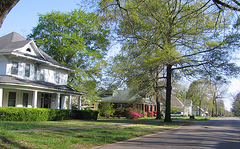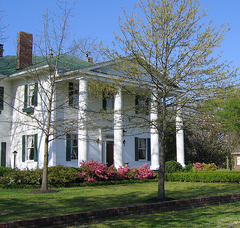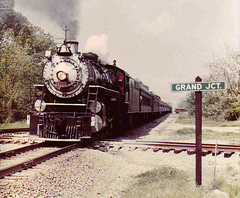Cities & Towns
Grand Junction
The town of Grand Junction is located in the southwestern corner of Hardeman County and extends into the southeastern corner of Fayette County along Tennessee State Highway 18.
 Grand Junction is the home of the 8,000 square-foot National Bird Dog Museum, Field Trial Hall of Fame and Wildlife Heritage Center and has hosted the National Field Trial Championships since their inception. The national trials are held each February on the Hobart Ames Plantation nearby and draw participants and celebrities from around the world.
Grand Junction is the home of the 8,000 square-foot National Bird Dog Museum, Field Trial Hall of Fame and Wildlife Heritage Center and has hosted the National Field Trial Championships since their inception. The national trials are held each February on the Hobart Ames Plantation nearby and draw participants and celebrities from around the world.
The Heritage Center features an expanded library, auditorium, classroom, a beautiful atrium and a kitchen facility to feed student groups. The center also sponsors an annual art contest for children from across the midsouth.
 Many original buildings remain in the town center, including Rogers and Sons Marble Works, established in 1879 and still in operation today; the old railroad depot and N.T. Richardson's General Merchandise Store, which Mr. Richardson operated until his death at the age of 104. The old cotton gin on Highway 57 is now the site of the annual community fish fry and other gatherings.
Many original buildings remain in the town center, including Rogers and Sons Marble Works, established in 1879 and still in operation today; the old railroad depot and N.T. Richardson's General Merchandise Store, which Mr. Richardson operated until his death at the age of 104. The old cotton gin on Highway 57 is now the site of the annual community fish fry and other gatherings.
Grand Junction sponsors a Christmas Parade each year with a tree-lighting ceremony and has one of the oldest and most active chapters of the Ruritan Club in west Tennessee. Old-time sock hops and singings are frequent occurrences in this tight-knit community. The Wilder Community Center doubles as a Senior Citizens Center and community hall. The town has several manufactures, including a bank, antique and gift shops, a sportsman's store, a clothing store, restaurants, a motel, a meat market and several mini-market/gas stations. Local children attend Grand Junction Elementary School and a Head Start Program that operates in town.
History
 Grand Junction was founded in 1858 at the "grand junction" of the Memphis and the Charleston and Mississippi Railroad lines. The town prospered as a center of railroad commerce prior to the Civil War, replete with a newspaper, two saloons, three hotels, a livery stable and numerous businesses.
Grand Junction was founded in 1858 at the "grand junction" of the Memphis and the Charleston and Mississippi Railroad lines. The town prospered as a center of railroad commerce prior to the Civil War, replete with a newspaper, two saloons, three hotels, a livery stable and numerous businesses.
Civil War
A three-year occupation by the Union Army during the Civil War nearly destroyed the town, which was strategically significant to both armies because of its rail lines. Some of the Civil War's most decorated generals from both armies passed through the town during the siege.
Rebuilding of the town after the war was well underway in 1878, when a yellow fever epidemic struck Grand Junction, killing more than half of its population of 150 residents. However, many current residents trace their roots to both victims and survivors of the epidemic, attesting to the resiliency and fortitude of Grand Junction's citizens.
Thomas Edison is purported to have been Grand Junction's first telegraph operator. Other famous visitors have included the author William Faulkner who frequently went quail-hunting in the area, baseball great Ty Cobb, and the renowned African-American scientist, Dr. George Washington Carver.
